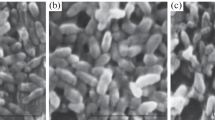Abstract
Natural uncouplers of oxidative phosphorylation, long-chain non-esterified fatty acids, cause uncoupling in the alkalo- and halotolerant bacterium Bacillus pseudofirmus FTU. The uncoupling effect in the bacterial cells was manifested as decrease of membrane potential and increase of respiratory activity. The membrane potential decrease was detected only in bacterial cells exhausted by their endogenous substrates. In proteoliposomes containing reconstituted bacterial cytochrome c oxidase, fatty acids caused a “mild” uncoupling effect by reducing membrane potential only at low rate of membrane potential generation. “Free respiration” induced by the “mild” uncouplers, the fatty acids, can be considered as possible mechanism responsible for adaptation of the bacteria to a constantly changed environment.
Similar content being viewed by others
REFERENCES
Skulachev, V.P. (1962) Ratio between Oxidation and Phosphorylation in Respiratory Chain[in Russian], Academic Press of the USSR, Moscow.
Skulachev, V.P. (1969) Accumulation of Energy in the Cell[in Russian],Nauka, Moscow.
Skulachev, V.P. (1998) Biochim. Biophys. Acta, 1363, 100–124.
Pressman, B.C., and Lardy, H.A. (1956) Biochim. Biophys. Acta, 21, 458–466.
Skulachev, V.P., and Maslov, S.P. (1960) Biokhimiya, 25, 1058–1065.
Levachev, M.M., Mishukova, E.A., Sivkova, V.G., and Skulachev, V.P. (1965) Biokhimiya, 30, 864–874.
Muntyan, M.S., Tourova, T.P., Lysenko, A.M., Kolganova, T.V., Fritze, D., and Skulachev, V.P. (2002) Extremophiles, 6, 195–199.
Kamo, N., Muratsuga, M., Hongoh, R., and Kobatake, Y. (1979) J. Membr. Biol.,49, 105–121.
Huttunen, M.T., and Akerman, K.E.O. (1980) Biochim. Biophys. Acta, 597, 274–284.
Grischuk, Yu.V., Muntyan, M.S., Popova, I.V., and Sorokin, D.Yu. (2003) Biochemistry(Moscow),68, 385–390.
Andreyev, A.Yu., Bondareva, T.O., Dedukhova, V.I., Mokhova, E.N., Skulachev, V.P., Tsofina, L.M., Volkov, N.I., and Vygodina, T.V. (1989) Eur. J. Biochem.,182, 585–592.
Gutknecht, J. (1988) J. Membr. Biol.,106, 83–93.
Sharpe, M.A., Cooper, C.E., and Wrigglesworth, J.M. (1994) J. Membr. Biol.,141, 21–28.
Tsofina, L.M., and Mokhova, E.N. (1998) Biosci. Rep., 18, 91–95.
Sharpe, M., Perin, I., and Nicholls, P. (1996) FEBS Lett., 391, 134–138.
Brustovetsky, N.N., Dedukhova, V.I., Egorova, M.V., Mokhova, E.N., and Skulachev, V.P. (1990) FEBS Lett., 272, 187–189.
Samartsev, V.N., Mokhova, E.N., and Skulachev, V.P. (1997) FEBS Lett.,412, 179–182.
Russell, N.J. (1989) J. Bioenerg. Biomembr.,21, 93–113.
Author information
Authors and Affiliations
Rights and permissions
About this article
Cite this article
Popova, I.V., Bodrova, M.E., Mokhova, E.N. et al. Uncoupling Effect of Fatty Acids in Halo- and Alkalotolerant Bacterium Bacillus pseudofirmus FTU. Biochemistry (Moscow) 69, 1165–1169 (2004). https://doi.org/10.1023/B:BIRY.0000046892.66818.5c
Issue Date:
DOI: https://doi.org/10.1023/B:BIRY.0000046892.66818.5c



